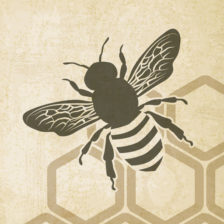The December 20, 2016 edition of the Apis Information Resource News has been published. It contains more information on the White House Pollinator Initiative, antibiotic use by beekeepers, and almond pollination prospects for 2017.
The local Ag Mag TheAgricultureMagazine has an article on The New Administration and Agriculture. It discusses the Farm Bill, NAFTA, crop insurance, immigration and regulations. It looks like the new president’s 70-member agricultural advisory committee will be advising on the new Secretary of Agriculture. The outgoing occupant’s remarks and biography are worth reading in this context.
It’s also worth remembering that the U.S Department of Agriculture is one of the lead agencies in White House Pollinator Health Task Force Initiative I discussed last month. Given a new administration, readers should not lose site of one fact: “Task Force agencies are to report annually on all metrics to the Task Force Co-Chairs, who will publicly disseminate the results on an annual basis so that the general public can monitor the progress each agency is making in fulfilling the commitments detailed in this Strategy, including collaboration with public and private stakeholders.” In other words, everyone is well advised to ensure the next administration continues to hear about this initiative, or it risks being simply put onto a shelf somewhere and forgotten.
We’re sure to hear about regulations being rolled back in the next administration, according to the Ag Mag article, including the so-called Waters of U.S. Rule. This is an EPA ruling, not an agricultural initiative, but presumably many of these will also be on the chopping block. For beekeepers, the newest and most challenging rule will be the one concerning antibiotic use that I discussed last month.
Basically, all beekeeper antibiotic use will have to be based on a written prescription by a veterinarian come January 1, 2017. A Bee Culture Catch the Buzz describes in some detail the new ruling, which really demands beekeepers establish relationships with a veterinarian. Two big problems arise immediately. How will beekeepers identify veterinarians? and how will veterinarians respond, given this is not part of their training? Vets in rural areas may get a head start given financial resources provided them due to regional issues.
The author of the above Buzz is a veterinarian, and fortuitously a new owner of Betterbee, who has created a website in an attempt to handle some of the above questions. A recent meeting in Florida reveals that this will not be easy, and confusion will probably prevail. Ohio’s initiative, described last month, may be a model some might want to follow: “The OSU Bee Lab and its partners are compiling a contact list of Ohio veterinarians who are also beekeepers and may be willing to form client/patient relationships with beekeepers and assist with pest diagnostics and management. Resources for training and education will be available to veterinarians to facilitate these changes.”
Given the new administration’s stance on regulations in general, the future of this new ruling in terms of enforcement is unknown. It probably is best to be “safe than sorry” at the moment.
Thanks to Joe Traynor for his December Almond Newsletter. Read about the upcoming almond pollination season, fungicide application, and funding research concerning honey bees and beekeeping. Joe’s comments published separately on climate change are worth a look. There are winners and losers when contemplating the effects of climate shifts. Mirroring somewhat the 2016 election results, the mid west with its relatively low population and large-scale grain crops, looks to come out an agricultural winner, whereas coastal specialty crops in areas inhabited by large numbers of human residents are likely to be losers.
Something not often well-explained is that the real debate is not so much about the changes per se, but the role human activity plays in generating them. So called “Man Made Global Warming” (MMGW) is the real 800 pound gorilla in the room, mostly pooh-poohed by politicians and others hooked to the fossil fuel industry. Many of these folks risk, however, enduring a Pyrrhic moment, when the cost of victory becomes too high. Joe asks if deniers, whether agriculturalists and/or politicians, living in areas at risk might consider purchasing some kind of “insurance” to cover either potential crop losses or their legislative legacy, if events reveal they backed the wrong horse.
See the full newsletter here.

